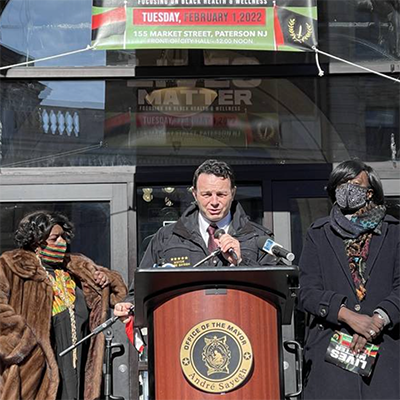By GABRIELLA DRAGONE
PATERSON, NJ – On Tuesday, Mayor Andre Sayegh and the Paterson Municipal Council raised the Pan-African Flag to mark the start of Black History Month.
“We celebrate and commemorate Black History Month, but like history, it should be celebrated from January 1 to December 31,” Sayegh said. “We celebrate leaders in our community who make history every day. Black history is being made every day because Black history is American history.”
The ceremony started with libations wherein those gathered raised their right hand to become one with their ancestors and connect their energy and honor to their ancestors.
“I stand here on the shoulders of all women, but specifically the Black women of color,” Nona Raine Fulmore Harris, student at Diane C. Lobosco STEM Academy said at the ceremony. “Because we are the only race of Black men to have been brought in these United States without a choice. Even today, we are the last race to be offered, hopefully, a seat on the highest court in the Supreme Court.”
Among the City Council membersin attendnace were Fourth Ward Councilwoman Ruby Cotton, Councilwoman-at-Large Dr. Lilisa Mimms, First Ward Councilman Michael Jackson, Third Ward Councilman Alex Mendez and Fifth Ward Councilman Luis Velez.
“These dignitaries are important,” Jackson said. “We stand on the shoulders of these people to be where we are. The stark difference of the African American communities is that we were brought here [United States} against our will and through it all, is a story of triumph. Alongside all the very important dignitaries, we are all equally, if not more important, because we stand on their [the dignitaries] shoulders to do the work that we do.”
“We all are important,” Mimms said. “Because when you go through your family lineage and where you’ve come from, you are reminded that some of us would not be here and somebody did not feel the understanding of that word ‘important’. One thing that we have to be reminded is that our lives matter and that we must never be ashamed to be unapologetically Black. Racism is real, and we have to never forget the fact that our struggle got us to our present. Where we stand today is that we stand on the backs of those who have fought blood, sweat and tears for us to be where we are.”
In September 1915, half a century after the 13th Amendment abolished slavery in the United States, the Harvard-trained historian Carter Woodson and minister Jesse Moorland founded what’s known today as the Association for the Study of African American Life and History. The group sponsored a national Negro History week in 1926, choosing the second week of February to coincide with Abraham Lincoln and Fredrick Douglass’ birthdays.
By the late 1960s, thanks in part to the civil rights movement and a growing awareness of Black identity, “Negro History Week” had evolved into Black History Month on many college campuses. In 1976, President Gerald Ford officially recognized Black History Month calling upon the public to “seize the opportunity to honor the too-often neglected accomplishments of Black Americans in every area of endeavor throughout our history.”
“For over 400 years, African-Americans have been fighting for freedom, the ability to thrive, live and go to school,” Assemblywoman Shavonda Sumter said. “I need us to take time to breathe; for us to check on other people, because what our Blackness means is that we check on one another.”
Also in attendance was Assemblyman Benji Wimberly who brought attention to social justice issues, such as voting and police brutality.
“We have to address those issues,” Wimberly said. “Let’s never fight against each other. Let’s come together as one because our lives matter.”
Since 1976, every American president has designated February as Black History Month and endorsed a specific theme. This year’s theme is “Black Health and Wellness” as it explores the legacy of not only Black scholars and medical practitioners in Western medicine, but also other ways of knowing throughout the African Diaspora. Today, Black History Month is a time to honor the contributions and legacy of African Americans across U.S. history and society, from activists and civil rights pioneers to leaders in industry, politics, culture and more.
The ceremony ended with Paterson officials raising the Pan-African flag.
